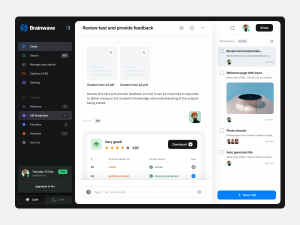As we progress through 2024, the e-commerce landscape continues to evolve at a rapid pace. With global e-commerce sales projected to reach $6.3 trillion by the end of the year, according to Statista, online businesses must stay ahead of the curve with effective digital marketing strategies. This blog post explores eight key strategies that can help e-commerce businesses thrive in the competitive online marketplace.
1. Artificial Intelligence (AI) and Personalization
AI-driven personalization has become a game-changer in e-commerce. By leveraging machine learning algorithms, businesses can analyze customer data to deliver tailored product recommendations, personalized content, and customized user experiences.
A study by Epsilon found that 80% of consumers are more likely to make a purchase when brands offer personalized experiences. Furthermore, Accenture reports that 91% of consumers are more likely to shop with brands that recognize, remember, and provide relevant offers and recommendations.
Implement AI-powered chatbots, recommendation engines, and dynamic pricing strategies to enhance customer experiences and drive conversions.
2. Video Marketing and Live Shopping
Video content continues to dominate social media platforms and consumer attention. In 2024, live shopping experiences are gaining significant traction, blending entertainment with instant purchasing capabilities.
According to Cisco, video will account for 82% of all internet traffic by 2024. Moreover, a report by Coresight Research predicts that the U.S. live-streaming market will reach $25 billion by 2025.
Leverage platforms like TikTok, Instagram Reels, and YouTube Shorts to showcase products, share tutorials, and engage with your audience. Incorporate live shopping events to create urgency and boost sales.
3. Voice Search Optimization
With the increasing adoption of smart speakers and voice-activated devices, optimizing for voice search has become crucial for ecommerce businesses.
OC&C Strategy Consultants project that voice commerce sales will reach $40 billion in the U.S. by 2024. Additionally, ComScore predicts that 50% of all searches will be voice searches by 2024.
To optimize for voice search:
– Use conversational, long-tail keywords in your product descriptions and content
– Implement structured data markup to help search engines understand your content
– Create FAQ pages that address common voice search queries related to your products
4. Augmented Reality (AR) for Enhanced Shopping Experiences
AR technology allows customers to visualize products in their own environment before making a purchase, reducing return rates and enhancing customer satisfaction.
Gartner predicts that by 2024, 50% of online retailers will have deployed live or post-production AR experiences. A study by Shopify found that products with AR content saw a 94% higher conversion rate compared to products without AR.
Implement AR features such as virtual try-ons for clothing and accessories or visualization tools for furniture and home decor items.
5. Social Commerce and Shoppable Content
Social media platforms are increasingly integrating shopping features, allowing users to make purchases without leaving the app.
eMarketer forecasts that U.S. social commerce sales will reach $79.64 billion in 2024, representing 6.6% of total ecommerce sales. Instagram reports that 70% of shopping enthusiasts use the platform for product discovery.
Focus on creating shoppable posts, utilizing Instagram Shopping, Facebook Shops, and Pinterest Product Pins to streamline the path to purchase for your social media followers.
6. Sustainability and Ethical Marketing
Consumers are becoming increasingly conscious of the environmental and social impact of their purchases.
A study by First Insight revealed that 73% of Gen Z consumers are willing to pay more for sustainable products. Additionally, Accenture found that 62% of consumers are attracted to brands that are environmentally responsible and ethical.
Highlight your sustainable practices, use eco-friendly packaging, and communicate your brand’s values and ethical commitments in your marketing efforts.
7. Omnichannel Marketing and Retargeting
Providing a seamless experience across multiple channels is crucial for capturing and retaining customers in 2024.
Harvard Business Review reports that omnichannel customers spend 10% more online than single-channel customers. Furthermore, a study by Omnisend found that omnichannel marketing campaigns result in a 287% higher purchase rate compared to single-channel campaigns.
Implement cross-channel retargeting strategies, ensure consistent branding across all platforms, and use data analytics to create a unified customer view for personalized marketing efforts.
8. User-Generated Content (UGC) and Influencer Partnerships
Leveraging UGC and influencer partnerships can significantly boost brand credibility and engagement.
According to Stackla, 79% of people say UGC highly impacts their purchasing decisions. A study by Influencer Marketing Hub found that businesses earn an average of $5.78 for every $1 spent on influencer marketing.
Encourage customers to share photos and reviews of your products, run UGC contests, and collaborate with micro-influencers who align with your brand values to reach targeted audiences.
Conclusion
As the e-commerce landscape continues to evolve, staying ahead of these digital marketing trends is crucial for online businesses. By implementing these eight strategies – AI-driven personalization, video marketing, voice search optimization, AR experiences, social commerce, sustainability focus, omnichannel marketing, and UGC ecommerce businesses can enhance customer experiences, drive engagement, and ultimately boost sales in 2024 and beyond.
Remember that the key to success lies in continuously analyzing your performance, staying adaptable, and refining your strategies based on your specific audience and market dynamics. By doing so, you’ll be well-positioned to thrive in the ever-changing world of e-commerce.















